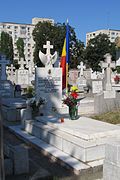| Ghencea Military Cemetery | |
|---|---|
| Romania | |
 The entrance to the military section | |
 | |
| For the Heroes of the Wars | |
| Location | 44°25′06″N26°03′12″E / 44.41833°N 26.05333°E Bucharest, Romania |
| Burials by war | |
Ghencea Cemetery is located in Ghencea neighbourhood of Bucharest, on Ghencea Boulevard, in Sector 6. The cemetery has two sections, civilian [1] and military. [2]



